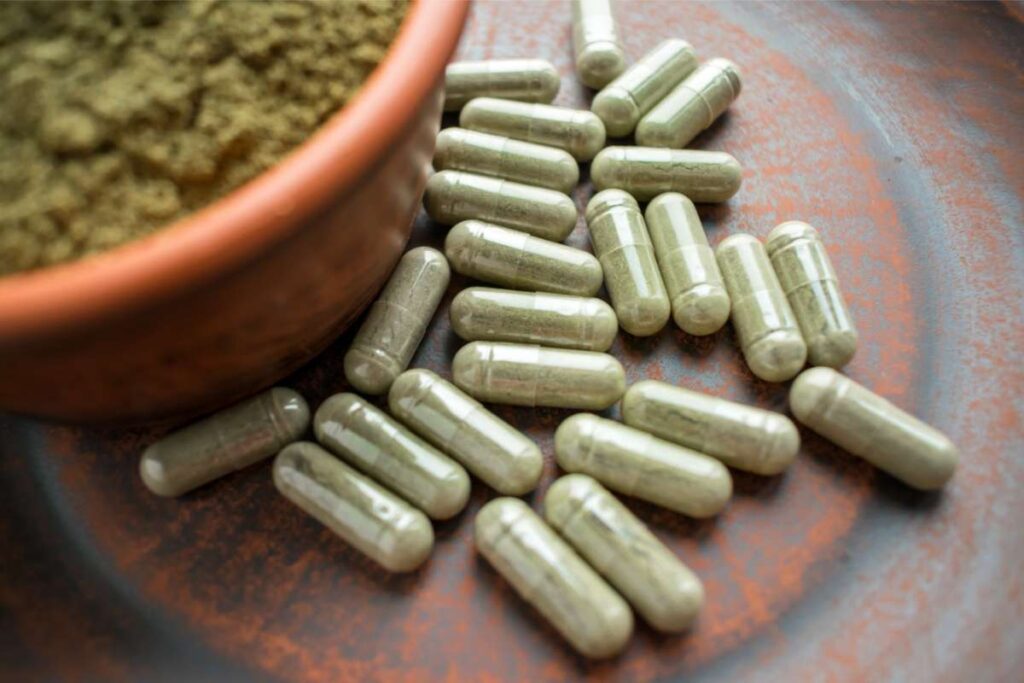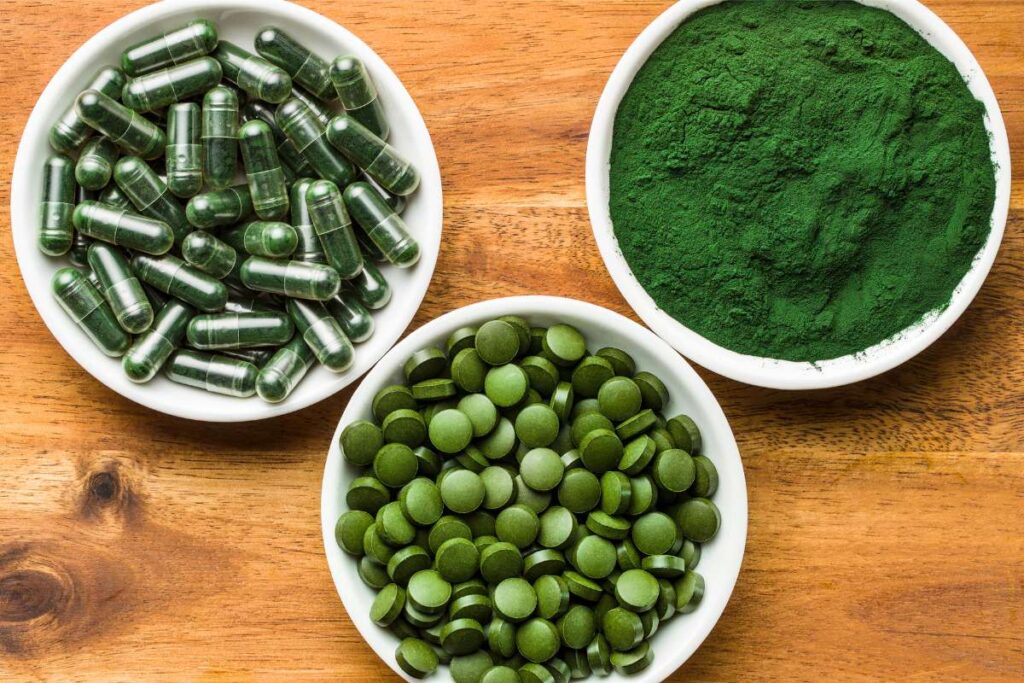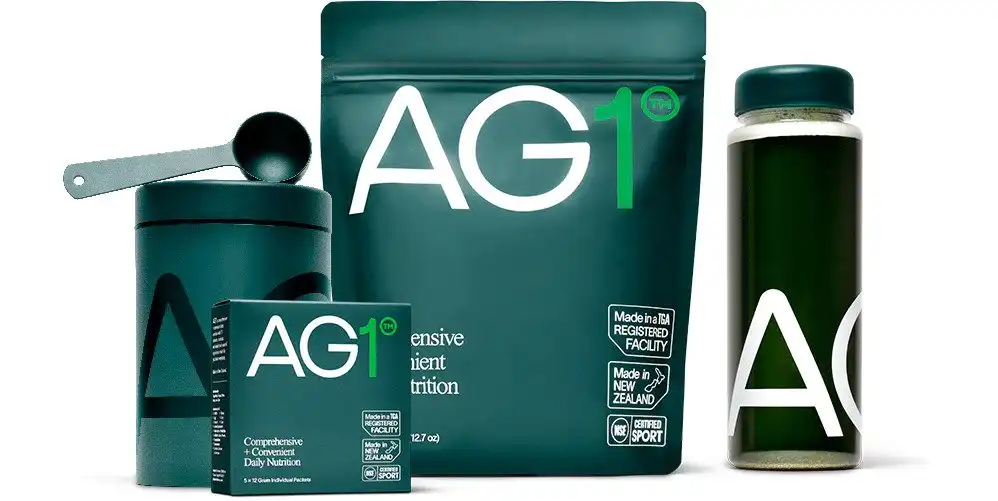This post may contain affiliate links at no additional cost to you. As an Amazon Associate I earn from qualifying purchases. Click to view our full disclosure.
What's inside
If you think you need a gut-health supplement, read this article comparing Seed vs Athletic Greens to choose the best one for you.
As a dietitian, I think it’s important to weigh all of your options before investing in a new supplement. Especially when it comes to our unique gut microbiomes!
Many of my clients ask about supplements for their guts. It always leads to me asking them this question: “What does the rest of your diet and lifestyle look like?”
The first step to a healthy gut is going to come from your daily habits. Eating a balanced, colorful diet, getting regular movement, sleeping enough, and reducing stress are all factors that need to be evaluated first.
Then, I suggest a supplement that can benefit your gut.
At a Glance

Choosing which is the better supplement for you will come down to what you want out of the supplement.
If you’re looking for just a probiotic and prebiotic supplement, Seed is one of the best on the market.
However, Athletic Greens offers not only probiotics and prebiotics, but a full range of your daily essential vitamins, minerals, and other beneficial ingredients in one scoop.
So, if you’re looking for an all-in-one product, Athletic Greens is best.
Keep reading to learn more about each of these products, how they may benefit you, and which I think is best!
Get free Vitamin D3+K2 AND 5 free travel packs when you buy a double subscription to Athletic Greens!
Quick Facts: Face To Face Comparison
| Seed | Athletic Greens | |
| Major Health Claims | Improved Gut Health Gut Barrier Integrity Improved Gut Immune Function Promotes Healthy Skin Promotes Heart Health Better Micronutrient Synthesis | Promotes Gut Health Supports Immunity Boosts Energy Helps Recovery |
| Dietary Preferences | Gluten-free,Dairy-free, Soy-free, Nut-free, Shellfish-free, Sesame-free, Glyphosate/AMPA-free, Corn-Free, Preservative-free, No Binders, Vegan | Dairy-free, Wheat-free, Gluten-free, Corn-free, Lactose-free, Sucrose-free, Egg-free, Peanut-free, and Vegan |
| Ingredient Count | 28 | 75 |
| Probiotic Count | 53.6 Billion AFU | 7.2 Billion CFU |
| Calories per Serving | N/A | 50 Calories per scoop |
| Macronutrient Count per serving | N/A | 6g Carbohydrate, 2g Protein, No fat listed |
| Net Carbs Per Serving | N/A | 4g |
| Serving Recommendations | Take 2 capsules daily, all at once, preferably on an empty stomach. | Take one scoop (12g) per day with 8-10 ounces of water first thing in the morning. |
| Flavors | N/A | Vanilla Pineapple |
| Price Per Serving | $1.67 | $3.30 – $3.63 |
| Certifications | Third-party tested | NSF Certified for Sport Third-party tested by NSF Manufactured in a TGA-registered, NSF (GMP) registered facilities |
Seed vs Athletic Greens: Introductions

What is Seed?
Seed is a daily two-in-one synbiotic supplement that comes in capsule form. There are 28 active ingredients in each serving, adding up to 53 Billion AFU of probiotics.
Seed’s main benefit is to promote better gut health by improving digestion, gut barrier integrity, and gut immune function.
However, other blends in this product can also benefit skin health, cardiovascular health, and micronutrient synthesis in our cells.
What is Athletic Greens?
Athletic Greens, now called AG1, is an all-in-one daily supplement that comes in powdered form; simply mix it into liquid and drink. There are 75 ingredients, including 7.2 billion CFU of probiotics.
Athletic Greens is known for its benefits on their identified “5 crucial areas of health”: energy, immunity, gut health, hormonal and neural support, and healthy aging. It is made of four different blends as well as additional vitamins and minerals.
Get free Vitamin D3+K2 AND 5 free travel packs when you buy a double subscription to Athletic Greens!
Seed vs Athletic Greens: Standout Features
What makes each of these products worth comparing?
Seed
- Provided in capsule form
- 2-in-1 prebiotic and probiotic
- 53.6 Billion AFU probiotics
- Vegan and free of gluten,dairy, soy, nuts, shellfish, sesame, glyphosate/AMPA, corn, preservatives, and binders
- Highly tested for heavy metals, potency, allergens, and other areas
Athletic Greens
- All-in-one daily nutrition shake
- A comprehensive panel of vitamins and minerals
- 7.2 Billion CFU probiotics
- Vegan, wheat, gluten, corn, egg, peanut, sucrose, soy, and dairy-free
- NSF Certified for Sport
- Manufactured in a TGA-registered, NSF (GMP) registered facilities
Seed Overview
Seed is one of the most well-known probiotic products on the market. Founded in 2015, the company has made it their mission to provide science-backed, high-quality probiotic supplements.
They aim to improve overall health by targeting gut health, which plays a role in all areas of our well-being.
Seeds’ products, including the Daily Synbiotic for adults and the Pediatric Daily Synbiotic for kids, are formulated based on extensive research and a deep understanding of how bacteria interact in our guts.
Main Benefits
- May improve gastrointestinal function: Many studies show the benefits of probiotics on gut health by regulating digestion, reducing bloating, balancing gut bacteria, and even improving digestive disorders and diseases like IBS.
- Can benefit skin health: Some probiotics, like in Seed’s dermatology blend, can improve skin health. Research shows balancing gut bacteria can reduce the appearance of inflammatory skin issues like acne, rosacea, and eczema.
- May support heart health: The bacteria in the cardiovascular health blend have been shown to have the potential to reduce cholesterol, blood pressure, and markers of inflammation, all of which are factors in heart health.
- Might support immune function: Research shows us that a healthy gut leads to better immune function. This is due to the microbiome’s role in immune system regulation and modulation of immune responses.
- Can promote micronutrient synthesis: Certain bacteria in our gut are responsible for creating essential vitamins. For example, vitamins B12 and K2 are produced in the gut. Therefore, having a good balance of these bacteria can help us avoid nutrient deficiencies.
Pros
- Capsule form so easy to consume with little taste
- High amounts and many strains of probiotics
- Third-party tested
Cons
- Not an all-in-one multivitamin
- Pricier than other probiotics on the market
- Uses proprietary blends
- Not for anyone who can’t swallow pills easily
- Automatically subscribed to monthly service
Get free Vitamin D3+K2 AND 5 free travel packs when you buy a double subscription to Athletic Greens!
Athletic Greens Overview
Athletic Greens is a very popular brand that is known for its primary greens blend product, now called AG1. The company’s mission is to offer a comprehensive daily dose of nutrition that supports overall health with a focus on gut health and athletic performance.
Athletic Greens’s formula includes 75 ingredients from fruits, vegetables, mushrooms, adaptogens, probiotics, prebiotics, enzymes, and more. With all of these beneficial ingredients comes many potential health benefits.
Main Benefits
- May boost energy: Nutrients like Vitamin B12 and Co-Q-10 in AG1 have been shown to support energy pathways in the body. This can lead to increased energy production, less fatigue, and even better athletic performance.
- Can help recovery: Athletic Greens is certified by the NSF for sport, relating to its benefits for recovery. Anti-inflammatory ingredients like curcumin can help reduce exercise-induced muscle damage and healing time.
- May improve digestion: Digestive enzymes and prebiotics AG1 can lead to better digestion and nutrient absorption. Meanwhile, probiotics have offered many benefits for your gut and other bodily processes (similar to what Seed offers).
- Can support immunity: Many nutrients in Athletic Greens like vitamins C and E, zinc, and antioxidants can help strengthen your immune system. These nutrients not only help to ward off acute illness like the flu and the common cold, but long-term, chronic diseases like diabetes and heart disease, too.
- Might support cognitive health: Adaptogens and antioxidants in AG1 can support brain function. Adaptogens like Rhodiola, for example, have been shown to improve mental focus, clarity, and even reduce stress.
Pros
- 75+ diverse ingredients
- A comprehensive panel of vitamins, minerals, probiotics, adaptogens, and produce
- Easily mixed with water, other fluids, or into recipes
- Option to make a one-time buy or sign up for a subscription
- Third-party tested and manufactured in a TGA-registered, NSF (GMP) registered facilities
Cons
- Uses proprietary blends
- Consumed as a drink, which can take time or have taste
- More expensive than other greens blends on the market
Get free Vitamin D3+K2 AND 5 free travel packs when you buy a double subscription to Athletic Greens!
Seed vs Athletic Greens: Ingredients Breakdown

Seed
Seed is a synbiotic blend, meaning it is an intentionally curated blend of many strains of probiotics and prebiotics that work together to offer maximum benefits.
There are 28 ingredients in Seed’s daily synbiotic, each of which are categorized into one of five blends. They work together to offer benefits all relating to gut health.
Keep in mind that this product is a probiotic and prebiotic only. It does not contain any vitamins, minerals, or other nutrition. This is also technically a proprietary blend because the exact amounts of each strain of probiotic and prebiotic fiber are not listed.
Lastly, you’ll notice Seed uses AFU to measure their probiotics instead of CFU. These only differ in the way they are measured, and are calibrated to be in agreement with each other. AFU is just a more specific method of measurement.
List of Ingredients
- Digestive Health / Gut Immunity / Gut Barrier Integrity Probiotic Blend, 37 Billion AFU
- Bifidobacterium longum SD-BB536-JP, Bifidobacterium breve SD-BR3-IT, Lactiplantibacillus plantarum SD-LP1-IT, Lacticaseibacillus rhamnosus SD-LR6-IT, Lacticaseibacillus rhamnosus HRVD113-US , Bifidobacterium infantis SD-M63-JP, Bifidobacterium lactis SD-BS5-IT, Bifidobacterium lactis HRVD524-US, Lactobacillus crispatus SD-LCR01-IT , Lacticaseibacillus casei HRVD300-US, Bifidobacterium breve HRVD521-US, Bifidobacterium longum HRVD90b-US, Bifidobacterium lactis SD150-BE, Limosilactobacillus fermentum SD-LF8-IT, Lacticaseibacillus rhamnosus SD-GG-BE, Limosilactobacillus reuteri RD830-FR
- Dermatological Health Probiotic Blend, 3.3 Billion AFU
- Bifidobacterium lactis SD-CECT8145-SP, Bifidobacterium longum SD-CECT7347-SP, Lacticaseibacillus casei SD-CECT9104-SP, Ligilactobacillus salivarius SD-LS1-IT, Bifidobacterium breve SD-BR3-IT
- Cardiovascular Health Probiotic Blend, 5.25 Billion AFU
- Lactiplantibacillus plantarum SD-LPLDL-UK, Bifidobacterium lactis SD-MB2409-IT
- Micronutrient Synthesis Probiotic Blend, 8.05 Billion AFU
- Bifidobacterium adolescentis SD-BA5-IT, Limosilactobacillus reuteri SD-LRE2-IT
- Microbiota-Accessible Polyphenolic Precursors™ [MAPP], 400mg
- Indian Pomegranate [whole fruit] (Punica granatum) (>40% Polyphenolic + Phenolic Bioactives)
- Other Ingredients
- Acid-Resistant Vegan Outer [chlorophyllin] and Inner Capsules [hypromellose, fermented gellan gum, water], Organic rice fiber, Organic rice extract blend
Athletic Greens
Athletic Greens offers a comprehensive panel of 75 diverse ingredients. They are split into four different categories, including the superfood complex, the extracts, herbs, and antioxidant complex, the digestive enzyme and mushroom complex, and probiotics.
Together, these ingredients work together as a synbiotic, multivitamin, and produce supplement to offer a range of health benefits.
AG1 is also a proprietary blend, meaning the specific measurement of each ingredient is not listed. Instead, the weight of each of those four blends are listed along with the amount of each vitamin and mineral.
List of Ingredients
- Alkaline, Nutrient-Dense Raw Superfood Complex, 7,388 mg
- Spirulina, lecithin, apple powder, inulin, wheat grass juice powder, alfalfa, chlorella, barley leaf, broccoli flower, papaya, pineapple, bilberry fruit extract, grape seed extract, green tea leaf extract, licorice root, lycium berry extract, ginger rhizome, slippery elm, kelp
- Nutrient-Dense Extracts, Herbs, and Antioxidants, 2,732 mg
- Alkaline pea protein isolate, citrus bioflavonoids extract, artichoke leaf extract, citric acid, rhodiola root, eleuthero root, milk thistle seed, R, S alpha-lipoic acid, ashwagandha, dandelion, hawthorn berry, beta-glucans, policosanol, coenzyme Q-10, stevia, vitamin K2
- Digestive Enzyme and Super Mushroom Complex, 154 mg
- Astragalus root, bromelain, burdock root, reishi mushroom, shitake mushroom
- Probiotics 7.2 billion CFUs, 38 mg
- Lactobacillus acidophilus UALz-01, Bifidobacterium bifidum UABb-10
- 21 Vitamins and Minerals
- Vitamin A: 555mcg, 62% DV
- Vitamin C: 420mg, 467% DV
- Vitamin E: 83mg, 553% DV
- Thiamin: 3mg, 250% DV
- Riboflavin: 2mg, 154% DV
- Niacin: 20mg NE, 125% DV
- Vitamin B6: 3mg, 176% DV
- Folate: 680mc DFE, 170% DV
- Vitamin B12: 22mcg, 917% DV
- Biotin: 22mcg, 1110% DV
- Pantothenic acid: 4mg, 80% DV
- Calcium: 118mg, 9% DV
- Phosphorus: 130mg, 10% DV
- Magnesium: 26mg, 6% DV
- Zinc: 15mg, 136% DV
- Selenium: 20mcg, 36% DV
- Copper: 195 mcg, 22% DV
- Manganese: 400mcg, 17% DV
- Chromium: 25 mcg, 71% DV
- Sodium: 45mg, 2% DV
- Potassium: 300mg, 6% DV
Get free Vitamin D3+K2 AND 5 free travel packs when you buy a double subscription to Athletic Greens!
Seed vs Athletic Greens: Taste Test

Seed Taste
Because Seed comes in capsule form, there really isn’t much to talk about in terms of taste. Users actually state it doesn’t have any taste or aftertaste, unlike other capsular supplements they have taken in the past.
The only thing to be wary of is the size of the capsules. They are on the larger side, so if taking pills isn’t an easy feat for you, taking Seed may not be, either.
Athletic Greens Taste
AG1 doesn’t have a labeled flavor but is described as a tropical pineapple vanilla essence. Many committed users love the taste and like to drink it every day, mainly commenting on the refreshing and sweet taste.
As with all greens supplements, though, there will be user preferences involved, so the flavor may not be for everyone.
Get free Vitamin D3+K2 AND 5 free travel packs when you buy a double subscription to Athletic Greens!
Seed vs Athletic Greens: Pricing Comparision
Seed Price
- Price
- $49.99 for one container of Seed (contains 30 servings)
- When you purchase, you are automatically subscribed to their monthly subscription
- Your first purchase comes with a free water glass and a travel vial
- Price Per Serving
- $1.66
- Container Size
- Not listed
Athletic Greens Price
- Price
- $99 USD for a single purchase of one container of Athletic Greens (contains 30 servings)
- $109 for a one-time purchase of 30 travel packets
- The monthly subscription to Athletic Greens will cost $79 per container or $89 for 30 travel packs per month
- Price Per Serving
- $3.30 per serving without a subscription
- $2.63 per serving with a subscription
- Container Size
- 12.7 oz per container
- 12g per single-serving travel pack
Get free Vitamin D3+K2 AND 5 free travel packs when you buy a double subscription to Athletic Greens!
Comparison of Side Effects and Safety

Seed mentions that their supplements should not interfere with any over the counter or prescription medications, breastfeeding, or pregnancy. They still suggest talking to a healthcare provider before taking it, though.
Meanwhile, Athletic Greens states those who are pregnant, breastfeeding, on medications, or under medical supervision should talk with their doctor before taking.
Seed and Athletic Greens are both made for adults over the age of 18. Seed does offer a pediatric product.
Both supplements are high in probiotics (Seed obviously higher than AG1), which can cause digestive issues when you first start taking them. If you experience nausea, cramping, diarrhea, or constipation, reduce your intake and gradually work your way back up to the suggested serving size.
Seed vs Athletic Greens: Which Is the Best Option?
In my opinion, comparing Seed and AG1 is like comparing an apple to the whole fruit basket.
Seed is a fantastic synbiotic supplement that can improve your gut health and has the potential to offer other benefits. However, it’s lacking in many areas that AG1 is not.
Athletic Greens offers a lot more nutrients and benefits than Seed, so it’s a better option if you want to avoid taking any other supplements.
Get free Vitamin D3+K2 AND 5 free travel packs when you buy a double subscription to Athletic Greens!
Why We Think AG Is the Better Option
After comparing Seed and Athletic Greens, AG1 is the better product.
While it comes at a higher price, it’s probiotic and prebiotic as well as a multivitamin and a fruit and veggie blend. If you were to invest in all of those separately, you’d end up spending much more.
It also offers up more potential health benefits and might be easier to consume.
Finally, I like that you can buy one container without having to sign up for the subscription service.
Final Thoughts on Seed vs Athletic Greens
AG1 is better if you’re looking for all of your daily supplements in one. However, both are great products from great companies.
That being said, make sure you’re investing in your daily habits and routines before investing in a product to fix them. No matter how many supplements you take, you can’t fix a poor diet, lack of exercise, and little sleep.
So work on your daily habits, and then check out AG1 to top up on all of your essential nutrients, probiotics, prebiotics, enzymes, and more!
Frequently Asked Questions
Is Athletic Greens as good as they say it is?
AG1 is a great product that contains 75 ingredients. These ingredients work together to offer many potential health benefits.
Does seed really work?
Yes, research and positive reviews would point to the efficacy of Seed probiotics.
What does Athletic Greens replace?
Athletic Greens can replace the use of multivitamins, probiotics, prebiotics, and enzyme supplementation. It cannot replace a balanced and colorful diet, though.
What is missing from Athletic Greens?
Athletic Greens are missing a few essential nutrients, including iron, vitamin K, and omega-3s. However, they offer supplemental products to take alongside the AG1 powder to cover all of your bases.
What is the best alternative to Athletic Greens?
There are a few greens powders that match up to Athletic Greens, including Primal Greens, Enso Greens, and Supergreen Tonik.
Should you take Athletic Greens everyday?
Yes, it is recommended on their website to take one scoop every day.
Popular Product Reviews:


